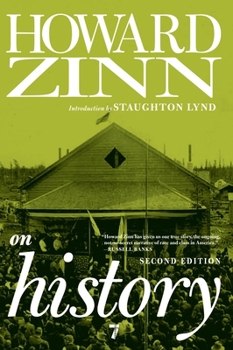Howard Zinn on History
Select Format
Select Condition 
Book Overview
Howard Zinn began work on his first book for his friends at Seven Stories Press in 1996, a big volume collecting all his shorter writings organized by subject. The themes he chose reflected his lifelong concerns: war, history, law, class, means and ends, and race. Throughout his life Zinn had returned again and again to these subjects, continually probing and questioning yet rarely reversing his convictions or the vision that informed them. The result was The Zinn Reader. Five years later, starting with Howard Zinn on History, updated editions of sections of that mammoth tome were published in inexpensive stand-alone editions. This second edition of Howard Zinn on History brings together twenty-seven short writings on activism, electoral politics, the Holocaust, Marxism, the Iraq War, and the role of the historian, as well as portraits of Eugene Debs, John Reed, and Jack London, effectively showing how Zinn's approach to history evolved over nearly half a century, and at the same time sharing his fundamental thinking that social movements--people getting together for peace and social justice--can change the course of history. That core belief never changed. Chosen by Zinn himself as the shorter writings on history he believed to have enduring value--originally appearing in newspapers like the Boston Globe or the New York Times; in magazines like Z, the New Left, the Progressive, or the Nation; or in his book Failure to Quit--these essays appear here as examples of the kind of passionate engagement he believed all historians, and indeed all citizens of whatever profession, need to have, standing in sharp contrast to the notion of "objective" or "neutral" history espoused by some. "It is time that we scholars begin to earn our keep in this world," he writes in "The Uses of Scholarship." And in "Freedom Schools," about his experiences teaching in Mississippi during the remarkable "Freedom Summer" of 1964, he adds: "Education can, and should, be dangerous."
Format:Paperback
Language:English
ISBN:1609801326
ISBN13:9781609801328
Release Date:June 2011
Publisher:Seven Stories Press
Length:288 Pages
Weight:0.60 lbs.
Dimensions:0.8" x 5.3" x 8.0"
Customer Reviews
1 rating
An Alternative Perspective of History
Published by Thriftbooks.com User , 20 years ago
Howard Zinn's approach to history comes directly from his own life experience. He saw the baby boom part of the twentieth century history evolve before his eyes with major events, such as the Civil Rights Movement and the further activism that occurred thereafter, and the effects of the war on Vietnam with archival work, to name a few. HOWARD ZINN ON HISTORY is a collection of essays and articles previously published in notable journals and magazines, such as the Midwestern Archivist and Saturday Review. Zinn examines topics that have affected him academically as well as personally, and appear somewhat out dated but timeless at the same time because of how much has progressed from the time he originally wrote the pieces. The book may serve as a teaching tool for a political or American history classes because of its small format. It is the type of book that will raise questions for the casual history reader as well as the any history major. However, there are serious political overtones that resonate with the majority of the essays that may suggest Zinn's revisionist perspective on history, but he exposes the study of history and the sum of its parts. Zinn states: "The scholar may swear to his neutrality on the job, but whether he be physicist, historian, or archivist, his work will tend, in this theory, to maintain the existing social order by perpetuating its values, by legitimizing its priorities, by justifying its wars, perpetuating its prejudices, contributing to its xenophobia, and apologizing for its class order" (p. 167). Zinn opens the door to history as well as an inquiry into how it is shaped and formed. He probes important topics that have often been overlooked, which raises important questions, what can be considered history, and how long does it take to be history?






